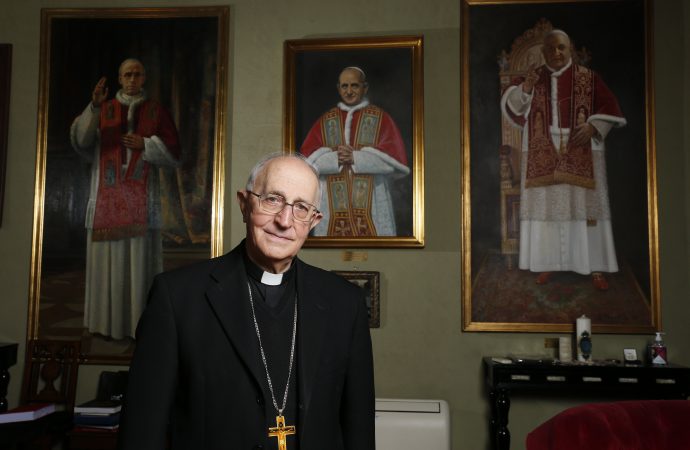ROME — The grand master of the Equestrian Order of the Holy Sepulchre of Jerusalem really hopes that the improving COVID-19 situation will finally allow him to make his first official pilgrimage to the Holy Land as head of the benevolent order.
But for the grand master, Cardinal Fernando Filoni, and for the 30,000 knights and dames of the Holy Sepulchre, the pilgrimage is not just about visiting the sites associated with Jesus’ life, death and resurrection and praying there.
The order’s Holy Land pilgrimages, he said, are also times for praying with and building relationships with “the living body of Christ,” the Christians who still live and worship and work in the land of Jesus.
Appointed grand master by Pope Francis in December 2019, Filoni’s inaugural pilgrimage was planned for June 2020, but the COVID-19 pandemic made that impossible.
The Israeli government announced in mid-April that it would begin allowing a limited number of groups of vaccinated tourists and pilgrims to enter the country beginning May 23.
Several of the order’s 60 “lieutenancies,” or regions, already are planning pilgrimages for late May or June. And Leonardo Visconti di Modrone, governor of the order, said they are hoping to organize the cardinal’s trip in the fall.
“Our vocation is to visit the holy sites, meditate, reflect, pray, build relationships — all things we will appreciate more since we haven’t been able to go,” Filoni said April 30 during an interview at the order’s headquarters in the Rovere Palace near St. Peter’s Square.
But that living body of Christ in the Holy Land still has been the order’s priority throughout the pandemic.
Filoni said he was “amazed” by the generosity of the knights and dames in donating to a special COVID-19 emergency fund for the Holy Land; after all, many of the members themselves were in lockdown and facing uncertainty about jobs and businesses.
Members, he said, added some $2.5 million to an already promised $1 million emergency fund to support the Latin Patriarchate of Jerusalem, especially its schools and charitable outreach. The figures are in addition to the $13 million the order provides to the patriarchate each year for the normal operations of its central offices, parishes, schools and social services.
One pilgrimage Filoni did make this year was a return to Iraq with Pope Francis in early March.
The Italian cardinal had served as nuncio to Iraq from 2001 to 2006, staying in Baghdad even during the Iraq War when U.S. and coalition forces invaded the country and ousted Saddam Hussein. He returned, as Pope Francis’ envoy, in August 2014 to comfort Christians and others seeking shelter in Irbil after Islamic State militants expelled thousands of people from Mosul and surrounding cities. He went again for Holy Week in 2015 to show the displaced that the pope and the church had not forgotten them.
Accompanying Pope Francis was “emotional,” he said. He was able to greet again “many of the bishops I knew from before — obviously, we’re all a bit older now — priests, religious and families who, despite everything, decided to remain.”
Iraq is a country that, “shaken by the war and its aftermath and then by ISIS, is slowly trying to find its way to being a country that is politically inclusive of everyone; it’s a country that is searching.”
“The visit of the pope was an encouragement because all of his speeches basically promoted peace, inclusivity, respect and the awareness that by working together they could have a better future for the whole country,” the cardinal said. And the pope was not speaking just about economic well-being, but a better future on a “human, civil, religious level.”
The message that members of different religious and ethnic groups all have something to gain from respecting each other and working together and that they all have everything to lose from continuing to be in conflict is a message valid not just for Iraq, but for the entire region, he said.
“The Middle East unfortunately has been shaken in the past 20 years by horrible, terrible turbulence and wars. Why? It’s true that it’s an area with a myriad of tribes, groups, cultures, histories, but it’s also true that if we continue to oppose each other it always will be a turbulent region,” Filoni said.
Pope Francis does not have “a magic wand,” he said, but building on his signing in 2019 of the document on human fraternity with Sheikh Ahmad el-Tayeb, grand imam of Al-Azhar University in Cairo, and on his encyclical, “Fratelli Tutti,” the visit demonstrated that Catholics are committed to forging friendships with others and working with them to build societies where everyone can live in peace and with freedom.






